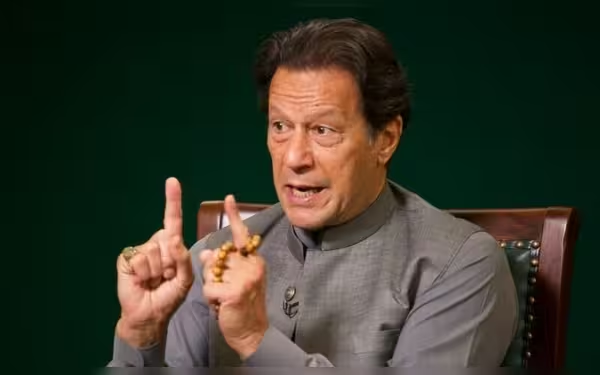Thursday, November 21, 2024 09:45 AM
Imran Khan Urges Nationwide Protest Against VPN Ban in Pakistan
- Imran Khan calls for protest against VPN ban on November 24.
- Government's VPN ban raises concerns over free speech.
- Khan criticizes PML-N for delaying Punjab elections.
 Image Credits: dawn
Image Credits: dawnImran Khan calls for a nationwide protest against the government's VPN ban, highlighting concerns over free speech and political dissent in Pakistan.
In recent developments, the government of Pakistan has announced a controversial move to ban Virtual Private Networks (VPNs), a decision that has sparked significant backlash from various quarters, particularly from former Prime Minister Imran Khan. VPNs are widely used tools that allow individuals to access the internet securely and privately, often bypassing government restrictions on certain websites and social media platforms. This ban has raised concerns about freedom of expression and the right to information in the country.
On Monday, Imran Khan, the leader of the Pakistan Tehreek-e-Insaf (PTI) party, addressed the media, urging citizens to join a protest scheduled for November 24 in Islamabad. He characterized this demonstration as a vital national movement, stating, "Today, I am calling on the entire nation to take to the streets on November 24. This is not just PTI’s issue, [rather] this is the issue of every Pakistani." His remarks highlight the broader implications of the government's actions, which he claims are aimed at silencing political dissent.
Khan expressed his discontent with the government's ongoing efforts to restrict access to social media and VPNs, arguing that these measures are a direct attack on free speech. He lamented, "X [formerly Twitter] was blocked, and now even VPN access is being restricted. People are being denied the right to access information, and Pakistan has lost billions due to these internet shutdowns. It’s a direct assault on the rights of people." This statement underscores the potential economic and social ramifications of such restrictions.
Furthermore, Khan accused the authorities of targeting his supporters through unlawful detentions, claiming that the government has shifted its tactics from combating terrorism to suppressing political opposition. He stated, "Earlier, they kidnapped people in the name of terrorism. Now, they do it under the guise of national security, picking up political workers instead of terrorists." This assertion raises questions about the balance between national security and civil liberties in Pakistan.
In addition to these concerns, Khan criticized the Pakistan Muslim League-Nawaz (PML-N) party for delaying elections in Punjab, arguing that this refusal violates the Constitution. He emphasized the importance of adhering to democratic principles and the rule of law, stating, "Instead of negotiations, we see arrests of our workers. The PML-N’s refusal to hold elections [to the Punjab Assembly] until [then-CJP Umar Ata] Bandial leaves is a violation of the Constitution."
As the political landscape in Pakistan continues to evolve, the role of foreign powers in the country’s internal affairs has also come under scrutiny. Khan remarked that statements from foreign governments should not be viewed as interference but rather as reflections of their policies regarding Pakistan.
In a related legal matter, an accountability court has directed Khan and his wife, Bushra Bibi, to submit statements regarding a £190 million corruption case. The court has also acquitted Khan and several others in a separate case concerning the violation of Section 144 of the Criminal Procedure Code, citing insufficient evidence.
As the protest date approaches, the situation remains tense, with many citizens contemplating the implications of the government's actions on their rights and freedoms. The upcoming demonstration could serve as a pivotal moment for the political landscape in Pakistan, as citizens rally for their rights in the face of increasing restrictions. It is essential for the public to remain informed and engaged, as the outcomes of these events may significantly shape the future of democracy and civil liberties in the country.













